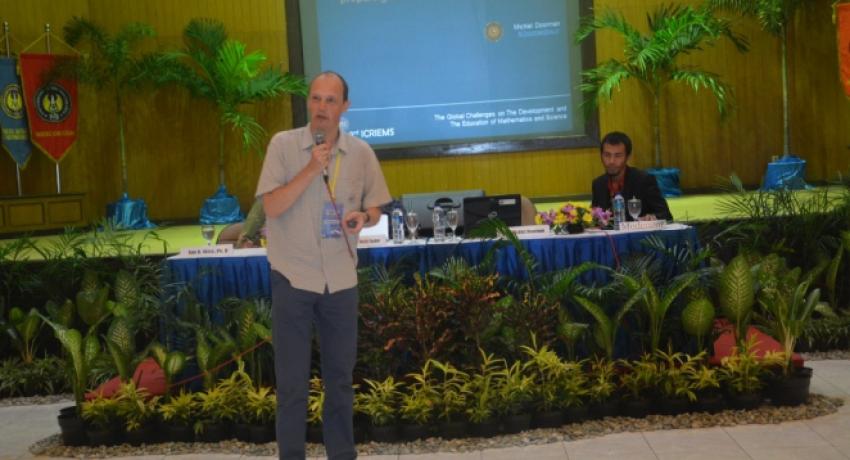Faculty of Mathematics and Natural Sciences (FMNS), Yogyakarta State University (YSU) held the International Conference on Research, Implementation, and Education of Mathematics and Science (ICRIEMS3rd) with the theme of "The Global Challenges on the Development and the Education of Mathematics and Science" in the Auditorium of YSU (16-17/5). The event was opened by the Vice Rector IV YSU, Dr. rer. nat Senam.
The keynote speakers at the seminar, namely Dr. Allen Price, Ph.D (Associate Professor at Emmanuel College Boston, USA), Dr. Michiel Doorman (Associate Professor at Utrech University Netherlands), Ana R. Otero, DVM, Ph.D. (Senior Lecturer at Emmanuel College Boston USA), Zafra M Lerman, Ph.D, FRSC (President of Malta Conference Foundation), Prof. Dr. Rosly Jaafar (Dept of Physics Universiti Pendidikan Sultan Idris) and Prof. Dr. Marsigit, MA (YSU).
In his paper entitled “The Scientific Approach to Higher Education: Examples From Physics Education Research”, Allen Price explained that YSU has one of the most respected teacher training programs in Indonesia, particularly in the field of physics. In addition, Yogyakarta is the center of higher education in Indonesia, with some colleges, thus providing access to many educators and professionals in higher education in Indonesia.
Allen further presented that the learning of topic on the learning of motion, mechanics, basic electrical circuits, optics and can be effectively demonstrated with simple and widely available components. Learning is designed in simple execution, but conceptually interesting, every activity is challenging students to solve problems or to explain a simple demonstration. "For example, one lesson on the optics requires students to place a small mirror on the wall so that they can see a picture of a piece of tape on their knees in the mirror. The solution of the case i.e. placing a mirror exactly half way between the knees and at the height of the eyes. It requires an understanding of the principles of reflection and geometry ", he continued.
Meanwhile, Michiel Doorman with his paper entitled “What can mathematics education contribute to prepare students for our future society?” explained an approach to mathematics education that tries to provide a learning trajectory which supports students in understanding and searching concepts and skills called Realistic Mathematics Education (RME).
The research findings show that the students must experience, and understand the function, purpose and utility of knowledge of a subject in the workplace. Thus, it is important that the work-based task is also in accordance with the objectives of the curriculum.
“RME and relevance to the workplace will make math and science more meaningful to students. In a classroom where students ask problem on the invention of mathematics, students should take an active part, ask questions, explore the situation, find their way to solutions and communicate their reflections. The approach aims to promote students ' curiosity, engagement and learning in depth, "he said.
Further, teachers need to extend their teaching method. One of the challenges for professional development is to link the learning of new teaching strategy and pedagogical practices of teachers in the classroom. Teachers must feel the need and have the resources to adopt new ideas and apply them in their daily practice. Class materials, such as assignments for students, can play an important role in the implementation.
In the Netherlands, RME influences textbooks in primary education. Full credit value of Netherlands students above scoop-item is 74%. This can not be fully associated with the implementation of RME, but this approach probably contributes to the quality of mathematics education. (witono)





